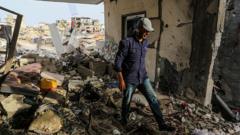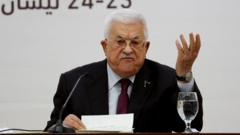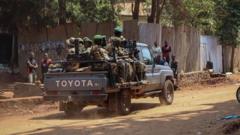In a notable operation, Israeli forces have recovered the remains of Staff Sgt. Oron Shaul, a soldier abducted by Hamas during the 2014 Gaza conflict. This mission reveals the ongoing challenges in securing hostages while addressing the humanitarian crisis in Gaza amidst renewed conflict sparked by Hamas's recent attacks.
Recovery of Long-Held Israeli Soldier's Body Amidst Ongoing Gaza Conflict

Recovery of Long-Held Israeli Soldier's Body Amidst Ongoing Gaza Conflict
The Israeli military successfully retrieves the remains of Staff Sgt. Oron Shaul, a soldier held by Hamas since 2014, highlighting the complexities of ongoing hostage negotiations.
Israeli forces have successfully recovered the remains of Staff Sgt. Oron Shaul, a soldier whose body has been held since the 2014 Gaza war. Following a covert mission coordinated by the Israeli military and Shin Bet security services, his family was informed after an identification procedure managed by forensic experts. This action comes in light of ongoing discussions regarding a ceasefire and hostage negotiations due to the conflict resurgence initiated by Hamas's assault on October 7, 2023.
Shaul was one of four Israelis held by Hamas, with others captured in 2014 and 2015. The operation underscored the complexities of retrieving both living and deceased hostages while negotiating the terms of their release and the humanitarian situation in Gaza, where pressing needs for aid have arisen against a backdrop of prolonged violence.
Speaking on the operation, Rear Adm. Daniel Hagari of the IDF commended the significant intelligence efforts that had taken place over the years to recover Shaul’s remains. Prime Minister Benjamin Netanyahu echoed these sentiments, emphasizing a commitment to rescuing all Israeli hostages, living or deceased, and has kept a focus on this mission since the outset of his term.
Hamas recently cited technical difficulties that postponed the delivery of hostages' names amidst ongoing negotiations for a Gaza ceasefire, stressing their continued allegiance to the agreement in light of past commitments. As Israel engages in operations intended to dismantle Hamas following the recent attacks that resulted in substantial casualties, community conditions in Gaza continue to deteriorate with widespread displacement and challenges in receiving essential supplies.
The proposed ceasefire plan involves an exchange of hostages for Palestinian prisoners held by Israel, an easing of military operations in Gaza, and efforts to facilitate aid access. The negotiations are set to expand as parties aim to bring about a longer-term resolution, though significant hurdles remain, particularly in addressing the status of other hostages still known to be with Hamas.
This situation encapsulates the intricate dynamics at play in the Israel-Palestine conflict, where military operations, hostage negotiations, and humanitarian concerns intertwine, demanding a multifaceted approach to future dialog and recovery efforts.
Shaul was one of four Israelis held by Hamas, with others captured in 2014 and 2015. The operation underscored the complexities of retrieving both living and deceased hostages while negotiating the terms of their release and the humanitarian situation in Gaza, where pressing needs for aid have arisen against a backdrop of prolonged violence.
Speaking on the operation, Rear Adm. Daniel Hagari of the IDF commended the significant intelligence efforts that had taken place over the years to recover Shaul’s remains. Prime Minister Benjamin Netanyahu echoed these sentiments, emphasizing a commitment to rescuing all Israeli hostages, living or deceased, and has kept a focus on this mission since the outset of his term.
Hamas recently cited technical difficulties that postponed the delivery of hostages' names amidst ongoing negotiations for a Gaza ceasefire, stressing their continued allegiance to the agreement in light of past commitments. As Israel engages in operations intended to dismantle Hamas following the recent attacks that resulted in substantial casualties, community conditions in Gaza continue to deteriorate with widespread displacement and challenges in receiving essential supplies.
The proposed ceasefire plan involves an exchange of hostages for Palestinian prisoners held by Israel, an easing of military operations in Gaza, and efforts to facilitate aid access. The negotiations are set to expand as parties aim to bring about a longer-term resolution, though significant hurdles remain, particularly in addressing the status of other hostages still known to be with Hamas.
This situation encapsulates the intricate dynamics at play in the Israel-Palestine conflict, where military operations, hostage negotiations, and humanitarian concerns intertwine, demanding a multifaceted approach to future dialog and recovery efforts.



















